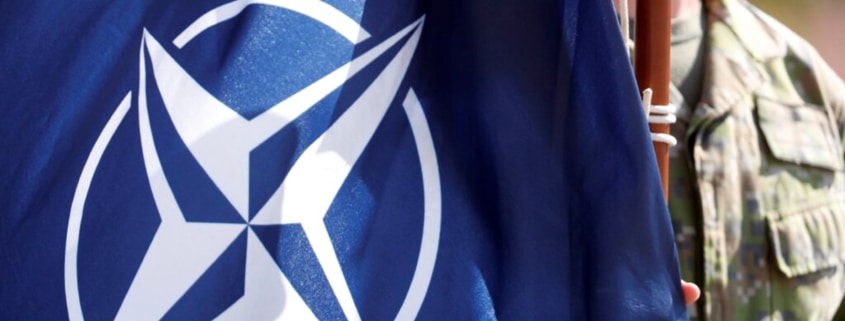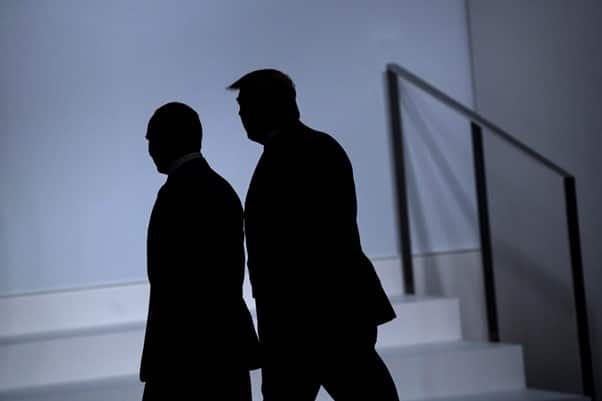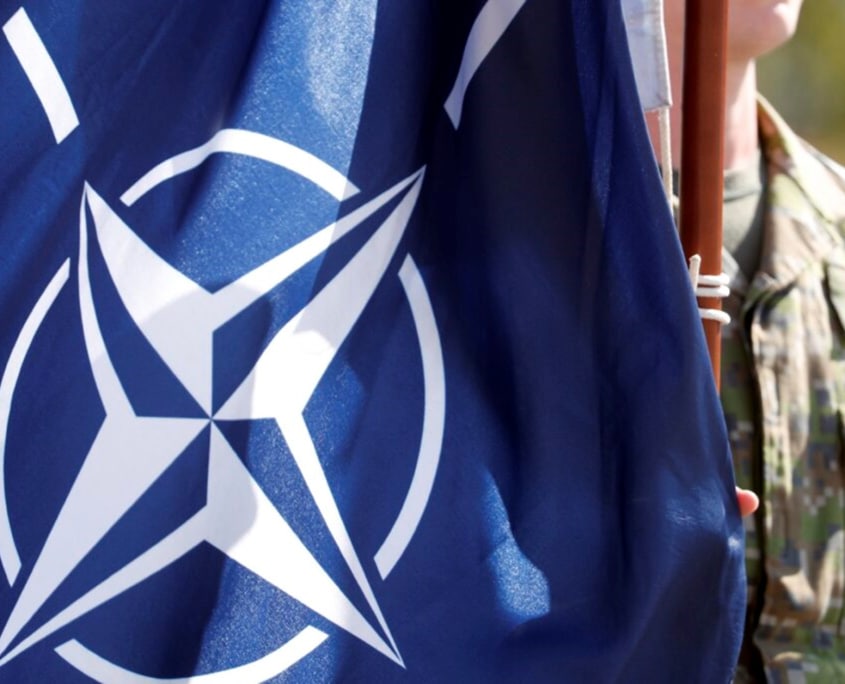
Europe caught between Putin and Trump
Even if Biden is re-elected, Europeans are aware that the era of strong transatlantic presidents may be coming to an end.
 Europe needs to figure out a way to take care of itself. But can it? | Brendan Smialowski/AFP via Getty Images
Europe needs to figure out a way to take care of itself. But can it? | Brendan Smialowski/AFP via Getty Images
FROM ACROSS THE POND Published: FEBRUARY 20, 2024 4:00 AM CET
BY IVO DAALDER
Ivo Daalder, former U.S. ambassador to NATO, is CEO of the Chicago Council on Global Affairs and host of the weekly podcast “World Review with Ivo Daalder.”
Two big news stories set the stage for this year’s Munich Security Conference, the annual convention of security policy wonks in the picturesque Bavarian town, held in the shadow of the Alps.
As the meeting got underway, news broke that Ukrainian forces were withdrawing from Avdiivka — the strategically important town in eastern Donbas, which Russia had never conquered in 10 years of war. The fight for this small city was brutal, and Ukraine held out for months against terrible odds. But in the end, Russia proved too strong for a Ukrainian army running out of people and ammunition.
Then came the shocking news of Russian opposition leader Alexei Navalny’s death in a remote Siberian prison. No one at Munich bought Moscow’s story that Russia’s most prominent dissident and thorn in President Vladimir Putin’s side had died of natural causes. Already poisoned once, Navalny’s sudden exile to a remote Arctic outpost had already suggested he might not come back alive.
“If your beliefs are worth something, you must be willing to stand up for them,” Navalny had written on Facebook on the third anniversary of his captivity. “And if necessary, make some sacrifices.” That he did.
Playing out in quick succession, both these events made for a sobering mood at the Hotel Bayerischer Hof. And sitting in meetings, talking over meals and in corridors over the past two days, my overriding sense was of a Europe confronting its greatest fears — a growing worry that Russia is winning in Ukraine and could turn to the rest of Europe next, and the increasing realization that the U.S. may well elect a leader who doesn’t believe in NATO and treats allies more like foes.
“Europe finds itself between Putin and Trump,” former Swedish Prime Minister Carl Bildt told me. And the Continent now needs to figure out a way to take care of itself. But can it? Will it? These were the questions dominating the weekend.
Europe is right to be worried: The war in Ukraine isn’t going well, and frontline troops are running out of ammunition and men. Explaining the decision to withdraw from Adviivka, General Oleksandr Tarnavsky said: “In the situation where the enemy is advancing on the corpses of his own soldiers with a 10-to-1 shell advantage, under constant bombardment, this is the only correct solution.” And without more military aid, Ukraine will face more such difficult decisions and costly retreats.
In this regard, Europe has done its part, sending whatever equipment its limited stockpiles contain and spending more on military support than the U.S. But this weekend, neither U.S. Vice President Kamala Harris nor a large congressional delegation could reassure Ukraine or its European supporters that the long-stalled U.S. aid package would pass soon.
No one was buying their excuses either. In reference to the decision for the U.S. House of Representatives to go on a two-week recess, Ukrainian President Volodymyr Zelenskyy pointedly noted: “Please, everyone, remember that dictators don’t go on vacation.”
And Estonian Prime Minister Kaja Kallas had choice words for Senator Pete Ricketts, who justified his vote against the aid package by stating that dealing with the large number of people arriving at the southern U.S. border was his priority. “Estonia also has large numbers of Ukrainian refugees on its territory. They represent 6 percent of our population. That would be equivalent to 20 million refugees coming at once into the United States,” she said.
By the way, at over 4 percent, Estonia’s aid to Ukraine represents by far the largest percentage of GDP of any country— and tenfold the U.S. commitment.
commitment.
As worrying as Russia’s success on the ground is, NATO allies are growing increasingly concerned that Moscow has larger ambitions | Toms Kalnins/EFE via EPA
However, as worrying as Russia’s success on the ground is, NATO allies are also growing increasingly concerned that Moscow has larger ambitions — such as ultimately challenging NATO directly. And though not immediate, the threat of Russia’s potential ability to pull this off in the next half dozen years is taken very seriously.
One person sounding the alarm is Estonia’s Foreign Intelligence Service Director-General Kaupo Rosin, who warned that Russia is anticipating a conflict with NATO in the next decade — and that it’s preparing accordingly. “There are things we can do to counter this,” he told me. “But we better take this seriously and start reacting now.”
I heard a similar message from Poland’s Minister of Foreign Affairs Radosław Sikorski: “We told you 15 years ago that Putin was coming. You didn’t believe us. We told you again 10 years ago. And five. You still didn’t believe us. Believe us now,” he said.
But the biggest uncertainty for most Europeans isn’t about Putin — it’s about America.
The U.S. Congress’ failure to support Ukraine has left many speechless. And Trump’s warning that he would “encourage” Russia “to do whatever the hell they want” to an ally who hadn’t “paid up,” still rings loud.
While one defense minister asked me, “Doesn’t he understand the value of allies?” (“Afraid not,” I answered), many others are finally beginning to come to terms with the possibility that come next January, they may well be on their own.
Eastern European allies are already boosting their defense spending to 3 percent of GDP and beyond, and NATO Europe as a whole will spend $380 billion — or 2 percent of their overall GDP — on defense this year.
However, while this far outstrips what Russia spends on defense — even as its economy has turned on a war footing and the country now devotes close to 10 percent of GDP to its war machine —it will take time for Europe’s spending to turn into real capabilities. For example, Poland will spend more on defense as a portion of GDP than any other NATO country, including the U.S. But the Patriots, F35 jets, Apache helicopters and other advanced equipment won’t be in place until the end of the decade.
Then, there are the production issues. Currently, multiple countries produce multiple types of 155-millimeter artillery shells for multiple types of launchers, many of which are incompatible with each other to discourage foreign competition. That must now change.
In line with this, European Commission President Ursula von der Leyen did promise a set of policy ideas to ensure Europeans spend more — and spend more productively. She also vowed to encourage better cooperation by appointing a commissioner for defense if she’s re-elected this year.
“Trump-proofing” NATO and European defense — as the phrase now goes — won’t be easy. But many now recognize it has to be done. Even if Biden is re-elected, Europeans are increasingly aware that the era of strong transatlantic presidents may be coming to an end.
A somewhat startling headline, it will be interesting to see this thought continue to develop within the EU as the EU is challenged to deal with its future security post the Ukraine war and a second term for TRUMP. President Emmanual Macron wants to bring Russia back to the negotiating table and begin dialogue on some form of a Security Pact with Russia, NATO’s existence in its current form will be an issue even more so now.![]()
The Bible has long revealed that Russia and an EU Army will enter into a final conflict with Israel and the Middle East. Germany is the key country in what Bible Prophecy refers to as the land of “Magog”. They are spoken of militarily as the “King of the North”. Together the Bible says that Russia and the EU will invade the Middle East in the Last Days. So Bible Students expect to see Germany and France taking a greater role in leading Europe. It is also interesting to see Germany taking greater control of a continent they tried to take by war and failed.
Yet again we see in Todays News Headlines words that show how the Nations are fulfilling the latter day alignment of Nations as Prophesied by the Bible.
See this article to learn more about this and the latter day prophecies of the Bible.
See this article for more on this subject: WHAT IS NEXT FOR EUROPE
![]()
